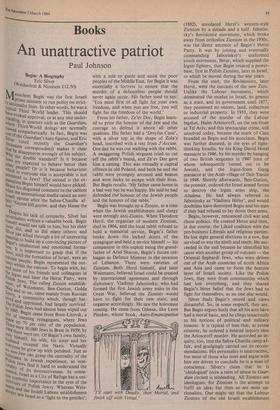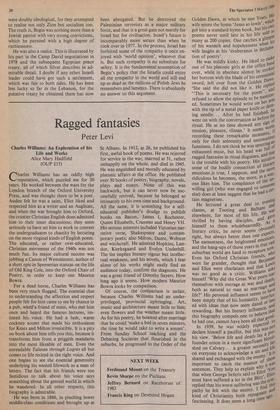Books
An unattractive patriot
Paul Johnson
Begin: A Biography
Eric Silver (Weidenfeld & Nicolson £12.50)
Menachem Begin was the first Israeli i Prime minister to run policy on strict- y nationalist lines. In other words, he was a typical Third World leader. This should have evoked approval, or at any rate under- whnding, inquarters such as the Guardian, ere Third -World doings are normally viewed sympathetically. In fact, Begin was c'n. 0 of the Guardian's hate figures, and Eric Silver (until recently the Guardian s Jerusalem correspondent) makes it clear t‘i:iat he d,
,sapproves strongly of his subject. Jews the double standard? Is it because are expected to behave better than
ether
People? Or is it because behaviour
which i
n everyone else is acceptable is not
HPe bitted to Jews? The second is the ex- atiati°11 Begin himself would have picked. ence his disgusted comment to the cabinet l'ihen the international media raised an anti- si,aeli uproar after the Sabra-Chatilla af- tan.:ew ‘GoYiin kill goyim, and they blame the J , ile1)esPite his lack of sympathy, Silver has r. vertheless written a valuable book: Begin inniself would not talk to him, but his elder sister did, and so did many others; and Silver has sifted through a lot of interesting iliaterial to build up a convincing picture of tiegins intellectual and emotional forma- j1311. It is important to grasp that if the Jews, until the formation of Israel, were an "..incast people, Begin represented the out- and within the outcast. To begin with, he, the most Irgun of his friends and colleagues in polish .irgun Wish jewasnd later the Herut Party, were The ruling Zionist establish- ,1,er.n, of Weizmann, Ben-Gurion, Golda Jew so so on, came mainly from Russian teewrY, a community which, though . bat- ikred and oppressed, had largely survived. b"e Polish Jews had almost been wiped out jt2945. Begin came from Brest-Litovsk, a OIL °f teeming synagogues, where Jews l'il-e IIP 70 per cent of the population. 19 ere were 30,000 Jews in Brest in 1939; .by on441, there were ten. Of Begin's own family, hi,' ',_ niinself, his wife, his sister and her e;snand escaped the Nazis. Virtually noery°ne he grew up with perished. Just as hoinnn-Jew can grasp the centrality of the poi?caust in Jewish experience, so non- ietlis.h Jews find it hard to understand the qu,"ItY of its destructiveness. In conse.- qu`nee, Israel as a City of Refuge has a um- su e .sYmbolic importance in the eyes of the inarvivors of Polish Jewry. Whereas Weiz- alwrin and theIsrael as Israel m
i Labour establishen
ays saw a 'light to the gentiles',t with a role to guide and assist the poor peoples of the Middle East, for Begin it was essentially a fortress to ensure that the murder of a defenceless people should never again occur. His father used to say: 'You must first of all fight for your own freedom, and when you are free, you will fight for the freedom of the world.'
From his father, Ze'ev Dor, Begin learn- ed to prize the honour of the Jew and the courage to defend it above all other qualities. His father had a 'Dreyfus Cane', with a silver top in the shape of Zola's head, inscribed with a text from J'Accuse. One day he was out walking with the rabbi. A swaggering Polish sergeant tried to cut Off the rabbi's beard, and Ze'ev Dor gave him a caning. This was virtually a capital offence in old Poland, and both he and the rabbi were promptly arrested and beaten and were lucky to escape with their lives. But Begin recalls: 'My father came home in a bad way but he was happy. He said he had defended the° honour of the Jewish people and the honour of the rabbi.'
Begin was brought up a Zionist, at a time when the Jewish establishment and clergy were strongly anti-Zionist. When Theodore Herzl, the organiser of modern Zionism, died in 1904, and the local rabbi refused to hold a memorial service, Begin's father broke down the locked doors of the synagogue and held a service himself - his companion in this exploit being the grand- father of Ariel Sharon, Begin's future col- league as Defence Minister in the invasion of Lebanon. There were varieties of Zionism. Both Herzl himself, and later Weizmann, believed Israel could be created by international agreement and through diplomacy. Vladimir Jabotinsky, who had formed the first Jewish army units in the Great War, believed the Zionists would have to fight for their new state, and organise accordingly. He saw the holocaust coming. He came from Odessa, like Leon Pinsker, whose book, Auto-Emancipation
I'll start with Deadly, then Mortal, and finish off with Venial.'
(1882), antedated Herzl's western-style Zionism by a decade and a half. Jabotin- sky's Revisionist movement, which broke away from orthodox Zionism in the 1930s, was the direct ancestor of Begin's Herut Party. It was by joining and eventually commanding Jabotinksy's uniformed youth movement, Betar, which supplied the Irgun fighters, that Begin created a power- base, first in Polish Zionism, later in Israel, to which he moved during the war years.
From the start, the Revisionists, later Herut, were the outcasts of the new Zion. Unlike the Labour movement, which dominated the exodus to Israel, its genesis as a state, and its government until 1977, they possessed no unions, land, collectives or industrial property. In 1933, they were accused of the murder of the Labour bigshot, Haim Arlosoroff, on the sea-front at Tel Aviv, and this spectacular crime, still unsolved today, became the mark of Cain branded on Begin and his associates. Begin was further damned, in the eyes of right- thinking Israelis, by his King David Hotel massacre in 1946, by his murder by hanging of two British sergeants in 1947 (one of whom subsequently turned out to be Jewish), and the Irgun-Stern Gang massacre at the Arab village of Deir Yassin in 1948. Shortly afterwards, Ben-Gurion, the premier, ordered the Israel armed forces to destroy the Irgun arms ship, the Altalena. He had always referred to Jabotinsky as 'Vladimir Hitler', and would doubtless have destroyed Begin and his men if they had refused to lay down their arms.
Begin, however, renounced civil war and chose politics. He created. Herut and then, in due course, the Likud coalition with the pro-business Liberals and religious parties. He lost eight general elections in a row, but survived to win the ninth and tenth. He suc- ceeded in the end because he identified his cause with another group of outcasts - the Oriental Sephardi Jews, who were driven out of the Arab countries of north Africa and Asia and came to form the bottom layer of Israeli society. Like the Polish Jews, they were from communities which had lost everything, and they shared Begin's bitter belief that the Jews had to fight for themselves, as no one else would.
Silver finds Begin's record and views distasteful. So, in some respect's, they are. But Begin argues hotly that all his acts have had a moral basis, and he clings tenaciously to his notions of political and military honour. It is typical of him that, as prime minister, he ordered a belated inquiry into the Arlosoroff murder. He accorded an in- quiry, too, into the Sabra-Chatilla camp af- fair, and grudgingly carried out its recom- mendations. His personality is unattractive, but most of those who meet and argue with him are driven to conclude he is a man of conscience. Silver's claim that he is 'ideological' (now a term of abuse in Guar- dian circles) is misleading. All Zionists are ideologues, for Zionism is the attempt to fulfil an idea; but then so are most na- tionalists. One might say that the Labour Zionists of the old Israeli establishment
were doubly ideological, for they attempted to realise not only Zion but socialism too. The truth is, Begin was nothing more than a Jewish patriot with very strong convictions, which he pursued with a high degree of ruthlessness.
He was also a realist. This is illustrated by his part in the Camp David negotiations in 1978 and the subsequent Egyptian peace treaty, all of which Silver describes in ad- mirable detail. I doubt if any other Israeli leader could have got such a settlement, which was fair to both sides. He has been less lucky so far in the Lebanon, for the putative treaty he obtained there has now been abrogated. But he destroyed the Palestinian terrorists as a major military force, and that is a great gain not merely for Israel but for civilisation. Israel's future is incomparably more secure than when he took over in 1977. In the process, Israel has forfeited some of the sympathy it once en- joyed with 'world opinion', whatever that is. But such sympathy is no substitute for safety. It is the fundamental assumption of Begin's policy that the Israelis could enjoy all the sympathy in the world and still end up as dead as the millions of Polish Jews he remembers and laments. There is absolutely no answer to this argument.











































 Previous page
Previous page